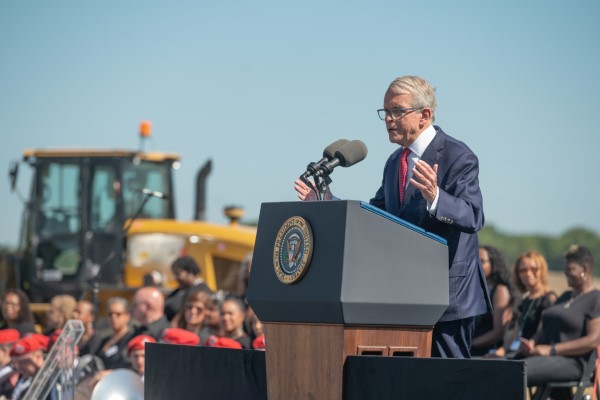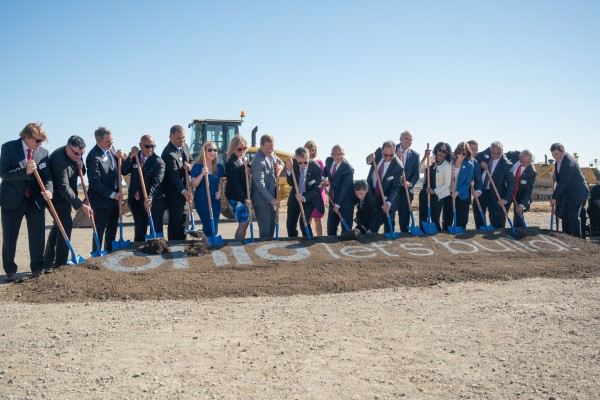Ohio Gov. Mike DeWine has been called “a uniquely Ohio story.” From a young age, he was taught the value of hard work, strong leadership and wise money management. He had to learn all those things because his family was counting on him to pull his own weight at the family business — a seed company in Yellow Springs.
He worked alongside his parents and grandparents at the seed business in a town of 4,000 people in southwest Ohio. He loaded seed bags onto trucks and boxcars, shoveled wheat out of trucks during harvest, and worked in the wheat fields to help ensure the purity of the seed. During that time, he watched his parents stay committed to each other for 65 years, up until they passed away just four days apart.
DeWine applied those values and those lessons to public service. He would eventually become Greene County Prosecutor, Ohio State Senator, U.S. Congressman, Ohio Lieutenant Governor, U.S. Senator and, ultimately, the 70th elected Governor of Ohio.
His life story has affected every decision he has made during his lengthy career as a public servant. In the following interview, he shares how his values impact his policies.
You said in your State of the State Address last year that it is a moral imperative to see that all Ohioans are fully educated. How do you plan to accomplish that goal, and where does Ohio currently stand in that regard?
GOV. MIKE DEWINE: We owe it to our kids to help them live up to their God-given potential. A well-educated population coincides with the needs of the state. To move forward, we have to have the workers of the future. When we talk to companies about coming to Ohio, they want to know — do we have the employees with the requisite skills they need? For our future, we know that a well-educated workforce is very important. We take the attitude that it has to be an all-of-the-above approach.
We put a big emphasis on birth to five years of age. We have expanded the number of kids in pre-school and other programs. We have created programs to reach out to pregnant mothers even before their child is born. In K-12, our big emphasis is on the science of reading. Reading is the key to being successful in school and in life. The science of reading is phonics — it is based on what we have learned over the years. We are putting a major emphasis on that. We are investing money to retrain teachers. We are also giving local schools money to make sure that the curriculum is aligned.

Photo courtesy of the Ohio Governor’s Office and JobsOhio
We are also expanding the Dolly Parton Imagination Library. Over 400,000 kids in Ohio have signed up for that. We are mailing out over 400,000 books a month to kids from birth to age five. That is the most of any state. We are investing in career tech too. We continue to expand career tech for kids in high school. Career tech schools are doing a good job working with local employers. The students work while they are still in high school. They move into a job right upon graduation. We are also attracting more kids to come to Ohio for college. We are a net importer of students to Ohio colleges. We also are putting more of an emphasis on keeping our young people home to go to college. Students will get an extra $20,000 in scholarships for four years if they are in the top 4% of their class.
Access to affordable housing for working families has become a top economic development concern around the country. How is Ohio attacking this challenge? Do you have any specific goals you plan to reach in Ohio on this issue?
GOV. DEWINE: This is very crucial. Every state is facing this. It is important to the overall health of our communities and our quality of life. We talk a lot about quality of life in Ohio. In our last budget, we set aside a significant amount of money to make housing a reality for more Ohioans. The Ohio Department of Development is providing $100 million in tax credits for this program.
You also mentioned last year that “we simply don’t have enough shovel-ready, development-ready sites for the kind of calls we are getting from companies all over the world.” To counter that challenge, you announced a one-time investment of $750 million to get sites like that ready. How is that money being spent, and are you satisfied with the progress that Ohio is making?
GOV. DEWINE: If you drove through Ohio, you would think it is all rural, but we are a state of city-states. We have 88 counties. Around 70 Ohio counties have less than 50,000 in population. It is a very diverse state. There is not just one or two major cities. And we have learned over the last five years that when companies are thinking about relocating or expanding, they are always in a big hurry. Once they decide to move, they want to move.
We know we have a competitive advantage if we have sites that are ready to go. This $750 million is being spent strategically. We know we have good sites in every region of the state. But a number of these sites are not shovel ready. They are not ready to go right away. We are picking these sites based on what we think will have the highest possibility of being attractive to companies. It is a unique plan that we are executing. We have identified these sites along with local economic developers. They exist in all different locations in Ohio. Access to water and access to a major highway are key assets. By investing this money, we will have a lot more sites ready to go. We landed Intel because we had a site that was ready to go. A lot of our wins came because we had sites ready to go.
Do you consider the Intel project in New Albany to be your administration’s singular economic development accomplishment? What does that investment mean for Ohio?
GOV. DEWINE: It certainly is the achievement that has gotten everyone’s attention and is probably the biggest. We were competing with 39 other locations around the country. I told our team that if we can pull this off, this will send a signal to companies all over the world that Ohio clearly has a lot going for it. Not only have we got Intel, but a lot of their suppliers have come to Ohio as well. A lot of their suppliers are expanding. It has sent the signal that Ohio is a great place to do business. We have seen that in the number of inquiries we are receiving. They are up significantly since then.
Ohio this year has 15 small towns ranked among the top 100 performing micropolitan areas in the country, according to Site Selection magazine. To what do you attribute Ohio’s small town economic strength and resilience?
GOV. DEWINE: Part of the quality of life in Ohio is that the vast majority of our counties have a county seat of less than 50,000 people. That is the center of that particular area. The quality of life in those communities is good. The cost of living is low. All of them are within a fairly easy drive of one or more major cities. They can see the Buckeyes or Browns or Bengals. They can see major theaters and art museums. You can live in a small town and be close to major cities. That is just one of the things that makes these small communities so special. Vibrant Communities is a JobsOhio program. We look and see if we can help the downtown there. It will have a multiplier effect.
FC Cincinnati and the Columbus Crew were arguably the two most successful teams in Major League Soccer last year, with the Crew winning MLS Cup and FCC winning the Supporters Shield. Each is playing in a gleaming new stadium. How important has the growth of soccer been in your state?
GOV. DEWINE: Our kids play a lot of soccer. They have been playing soccer for a long time. Having two very successful MLS teams in Ohio is important. They are both playing in brand new stadiums. They are wonderful places to watch soccer. It gives us the ability to get people excited about soccer. It is another thing that increases quality of life.
“After we work a deal out, we do not look at that as a time to walk away. We redouble our efforts to help you cut through red tape and get anything you need to construct your business and stay on time.”
— Gov. Mike DeWine
Your own personal story has been called a uniquely Ohio story. Why is that?
GOV. DEWINE: My wife and I both grew up in Yellow Springs, a town of 4,000 people in Southwest Ohio. We both went to Miami University in Oxford, Ohio. My family was in the wholesale seed business selling to farmers’ elevators in four different states. My wife, Fran, worked there in high school and college as well. We have experience in small business. We know what it takes to make a small businesses work. We have eight children, 27 grandchildren and one great-grandchild. Family is very important to Ohioans.

Photo courtesy of the Ohio Governor’s Office and JobsOhio
What does it mean to be an Ohioan?
GOV. DEWINE: I have described Ohioans as “No Drama People.” We get up in the morning and we do our job. We are a state of innovators, people who do research and take risks. That goes on top of the work ethic we have in Ohio. That has made Ohio a unique state. And we are friendly people.
Does Ohio plan to go after another semiconductor manufacturing plant? How big do you think this industry can grow in Ohio?
GOV. DEWINE: Yes, absolutely. We are going after the business of the future. This is a manufacturing state. We are putting particular emphasis on the manufacturers of the future like Joby Aviation that will produce flying taxis in Dayton. We will certainly go after any company that we think has a future and will create jobs in the future. We call this the Silicon Heartland.
Your state has compiled some pretty impressive wins of late in the electric vehicle sector. Is that the future of automotive manufacturing in Ohio?
GOV. DEWINE: It certainly is. Historically, we have been an auto manufacturing state and an auto parts maker. A switchover to electric vehicles is occurring. For us to be where we want to be, we have to make that switchover as well. Honda has established its battery technology research center at The Ohio State University. There is a partnership to build a new battery plant in Jeffersonville, Ohio. GM invested $750 million in Toledo to produce electric drive units. And Ford is investing hundreds of millions to make new EVs here too.
Do you have any other advice for corporate executives who may be evaluating Ohio right now as a potential business location?
GOV. DEWINE: Yes. The dollars and cents of the deal have to make sense. We have relatively low taxes. We have stability in our public policies. Businesses do not like surprises. When people make decisions, they want to know that the people moving here are going to like living here. I have discussions with CEOs about that. Also, after we work a deal out, we do not look at that as a time to walk away. We redouble our efforts to help you cut through red tape and get anything you need to construct your business and stay on time. Our ability to follow up is very important. We do that very well in Ohio.

